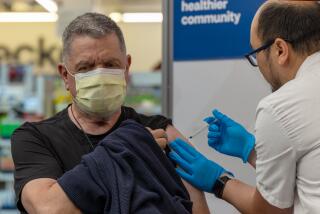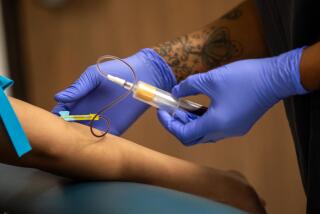No More Excuses When Lives Are in Danger : AIDS: A major push for widespread HIV testing could become a catalyst for better medical care across the board.
- Share via
An estimated 200,000 Californians are infected with the AIDS virus, but half of them don’t know it because they don’t have symptoms and haven’t been tested. (AIDS can take two to 10 years or more to develop after infection with the HIV virus.) Life-prolonging medication is available and necessary for many of them. Unfortunately, the social and political realities of the AIDS epidemic have prevented well-intentioned public health officials from doing what they know is necessary: strongly advising all physicians to offer HIV testing to all patients, male and female, 16 to 49 (the age range of the vast majority of infected people), in all treatment settings--private, clinic and hospital.
In the past, physicians have been encouraged to discuss HIV testing with patients who are at the highest risk, but this approach has been unsuccessful. Physicians remain reluctant to ask about drug use and sexual behavior when taking patients’ histories--and patients seldom offer such information on their own. In any case, a patient’s history is not sufficient for determining risk. In one study, half of the women who tested positive for HIV did not give a history that would indicate risk because they were unaware that their sexual partners were infected or had engaged in high-risk behavior.
For HIV testing to be most effective, informed consent and adequate pre- and post-test counseling must be provided--whether the test is positive or negative. Most physicians are unwilling or unable to offer appropriate counseling and do not like having to obtain informed consent.
Gay and bisexual men still make up the majority of people with AIDS in this country. Many gay community medical leaders are fearful of widespread testing--even voluntarily. Infected people have lost their jobs, their homes, their health insurance. In addition, some politicians have tried to make widespread testing a punitive concept. Because of these abuses, public health officials have been reluctant to speak out in favor of widespread testing.
But the biggest barrier to calling for widespread voluntary testing is the shortage of medical services--both in evaluation and care--for people who don’t have health insurance. In Los Angeles County, for example, there’s already an unacceptably long delay for HIV-infected people to be seen in public clinics for evaluation of their immune systems and to determine if AZT and other life-prolonging medications are needed.
If thousands of newly diagnosed HIV-infected patients descended on public facilities, the entire system probably would collapse. Already, people with other life-threatening medical problems like diabetes and hypertension are finding increasing delays in obtaining appointments. So, to keep the system going, public health officials remain silent.
This is inexcusable. Thousands of people who don’t know that they are infected will become ill; meanwhile, many of them will infect others. And many who do have access to medical care will not have the benefit of a timely diagnosis.
The resistance of physicians and the gay community to widespread offering of thetest can be overcome with a major education effort. But the problem for people without health insurance can only be solved with money.
So far, people with diabetes and hypertension--indeed, all those affected by health-care cuts--have not mobilized. Would thousands of newly diagnosed HIV-infected people be more effective? Perhaps the time has come to find out. Perhaps AIDS can be the catalyst to improve access to medical care just as it has improved access to experimental drugs for people with life-threatening diseases.
Public health officials who work hard behind the scenes for more AIDS funding must speak out. They must urge widespread offering of the HIV test. They must educate physicians and the gay community. And they must fight for improved health care for the uninsured.
Preventive medicine is what public health is all about. Public health officials must do what they know is right.


